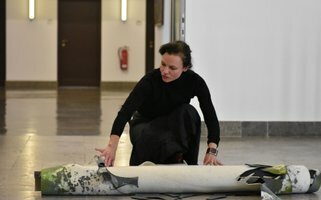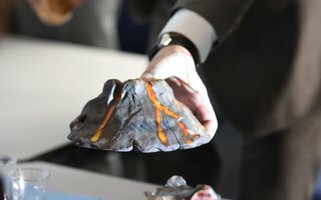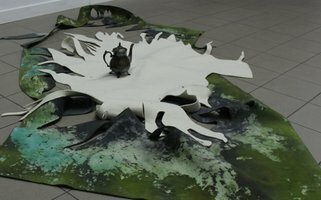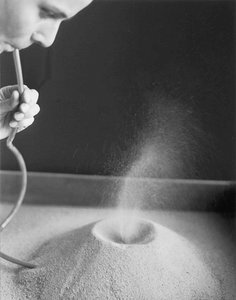Valeska Peschke operates with performances that function without any words as well as performative talks that include language in the form of poeams, comics or so called “travel books”. The latter includes travels in Berlin, looking for abstract images of volcanoes. All these kinds of performances and performative talks can be understood as a manifestation of facts that causes a change of perspective in a creative and narrative way. Through this motion of actions a shift of thinking and perception occurs and thus, a change in knowledge as well.
Her works pick up ideas from the philosopher Jaques Derrida and his tool of deconstruction. Derrida wants to criticise language from the inside out and show that symbols do not have a meaning from the beginning. Rather meanings arise out of the usage of symbols within the world. Therefore, Derrida focuses on a decomposition of the system of texts from the inside which eventually can also be seen on the outside. This aspect shows parallels to Peschke’s understanding and her different kinds of concepts of volcanoes. Also the volcano is destroying itself from the inside out, at the same time though shaping itself and having new arising. Furthermore Derrida follows the idea that there is no fixed and determined existence, but rather are we driven by the need of security looking for systems and models onto which we can project security and stability. The volcano symbolises this ongoing insecurity and change in its form; between destruction and fertility, solid and liquid.
For a long time there was the opinion that language only represents our thoughts. Derrida, however, denies this idea and is convinced that language constitutes the way we think. Speaking is always acting and therefore also every kind of performance is acting. It doesn’t matter if it is verbal or non-verbal, performance as a way of acting is constitutive for our thinking.
In texts (for Derrida the term text includes a wide range of things e.g. every kind of gesture or act) terms are used which do not stand for themselves but rather does their meaning arise through their usage und its context used.
In performances and performative acts, Peschke shows how ideas are understood and how we can always reinterpret them. By this reinterpretation a whole new appearance of the given arises. Also Derrida does not see a beginning or an ending in creative processes, but follows the idea of constant lively motion. Motion and process are characterised by their continuous progress, emergence and decay, being and not-being. There is never an explicit designation. A term has always to be understood in respect of everything that is absent as well. If absence is included in our understanding of designation and definition, we can constantly make redefinitions and reinterpretations of objects, symbols or situations.
Only by being aware of the difference of presence and absence, we can create a constitutive meaning of something. Derrida names this inclusion of absence “double gesture”.
Literature:
1Jaques Derrida: Eine unmögliche Möglichkeit, vom Ereignis zu sprechen. Vortrag, Berlin: Merve-Verlag 2003
2 Jaques Derrida: Grammatologie. Frankfurt am Main: Suhrkamp Verlag 1983
3 Jaques Derrida: Die Schrift und die Differenz. Frankfurt am Main: Suhrkamp Verlag 1972.
4 Kunstforum. Atlas der Künstlerreisen. International. Bd. 137 Juni - August 1997
5 Katalog zur Ausstellung Atlas Mapping. Offenes Kulturhaus Linz., Kunsthaus Bregenz, Magazin 4. Wien: Verlag Turia + Kant 1997
6RoseLee Goldberg: Performance Art. From Futurism to the Present. Yugoslavia: World of Art 1990.
Copyright © All Rights Reserved Idea & Concept & Art by Valeska Peschke, Berlin 2017



